- Home
- Leigh Barker
Calum's Exile Page 5
Calum's Exile Read online
Page 5
Calum pointed at the small stand of trees at the side of the road. “Here’ll be just fine.” He stepped down off his borrowed horse and unhitched the reins from his saddle of the first of the six horses he’d been leading for the last three miles. Far enough from the village to avoid any repercussions.
John swung down and led the other six horses up into the trees. “D’ya think the animals will be all right here?”
Calum looked around. “Aye, there’s water and grass. And they’ll be seen soon enough by an English patrol.”
“That’s fine. I wouldna want them to suffer just because they were with the English.”
Calum returned to his borrowed horse and patted its neck. “It’s nay your fault you were the brains of the two.”
John joined him and patted his horse too, just so it wouldn’t feel left out. And get vindictive. “You gave our horses to that priest. You recall they were to pay for our passage.” He squinted at his friend. “You’re nay thinking we’ll work our way?” He shook his head. “I worked on a ship once—”
Calum laughed. “Across the English Channel. Took a day, did it not?”
“Aye, but it was the longest day of my life.”
“I think the passage to America will take longer than a few days.”
“Aye, it will, and that’s why I’ve no desire to work my way across.”
Calum flinched at the thought. Swabbing the decks was not one of his leading ambitions.
“So,” said John, who was now trying to get his foot into the stirrup, but the horse kept moving sideways. “How… are… we—will the damned horse nay stand still!”
“It knows who’s the boss, that’s the problem.” Calum reached over and held the horse’s reins while John climbed on very carefully. “And to answer the question you’re trying to ask, we won’t be swabbing the decks all the way to America.”
John sat back in the saddle and breathed a sigh of relief, either because he was finally mounted, or because there was to be no deck swabbing. “You’ll not be thinking of selling these?” He patted his horse.
Calum swung effortlessly up into the saddle. “No, that’ll just get us hanged. Or the poor soul who buys them.”
“Then you have me. We don’t have the thoroughbreds, now you’ve given them away. We canna sell these English horses. And, unless you’re keeping a secret purse, we don’t have any money.” The horse started to dance sideways again. He kicked it in the ribs out of frustration. The horse stayed still. He’d learned something there, but decided it would be a bit too hard on the animal, and would probably get him thrown off at the first opportunity. And he was right.
“I don’t have a secret purse. And no, we don’t have any money. But the English do.” He started his horse moving out of the trees.
John’s horse wasn’t for moving, having decided being kicked in the ribs was a breach of horse-rider etiquette. John leaned forward and whispered in its ear. The horse followed Calum.
“Good horse,” John said and patted its neck. “You’re right,” he said as he rode up alongside Calum, “the English have money, and they have a great big army to guard it.”
“They do that.”
“Then how—” John gave up. “Never mind. Just so long as we d’na have to swab decks.” He leaned down and patted the saddlebag and tutted. “No food and no whisky. We’ll be having a cold night, then.”
“Aye,” said Calum, “but not as cold as those laddies back at the church.”
“No more than they deserved,” John said and looked up at the dark sky. “There’ll be more rain before morning. M’be snow.”
Calum looked up too. “Aye, we’ll need to find somewhere to get out of the cold.”
They rode on for another hour in silence, except for John’s stomach. Then Calum pointed into the darkness. “There’s a farmhouse there. The good people will put us up.”
“I canna see a farmhouse.” John peered into the icy wind. “And why would they put us up? We’re strangers.”
“People like me,” Calum said, and rode up the narrow track leading to the farmhouse.
“No they don’t,” John said, and followed.
Calum dismounted in front of the single-storey stone farmhouse and tapped the battered wooden door. There was no answer, but he’d seen the light go out as they approached. He knocked again, harder.
“We’re no English!” he called.
A minute later they heard the sound of heavy bolts being pulled back, and then the door opened to show an ancient man holding a pistol that looked even older than him.
Calum put up his hands in surrender. “We’re needing somewhere to get out of the cold for the night.”
The old man squinted at him. “What are you wanting me to do about it? Does this look like an inn?”
“Can we stay in your barn?”
The squint got thinner. “You’ll steal the livestock.”
“I promise not to steal your livestock,” Calum said, putting his hand on his heart.
The squint softened. “Have you money to pay?”
“If we had money,” John said, towering over the little man, “d’ya think we’d be asking to stay in this dump.”
“What my friend means,” Calum said quickly, “is that the English took our money. We’re away to get some more. And we’ll be sure to come back this way when we do.”
“You will?” The old man’s squint had turned to a frown. “Are ya daft, man? Why would ya do that?”
John laughed. “Got you there, Calum.”
“You look like fighters. Were you with the Bonnie Prince at Culloden?”
Now it was Calum’s turn to frown. “Why d’ya ask?”
“Because if you was, you’re welcome here.”
“Aye,” John said quickly, “we were with him on Drummossie Moor. As close as we are to you.”
The old man pulled the door open. “Will you have a wee dram with me, then?”
Calum staggered aside as John elbowed his way past.
John swung down and led the other six horses up into the trees. “D’ya think the animals will be all right here?”
Calum looked around. “Aye, there’s water and grass. And they’ll be seen soon enough by an English patrol.”
“That’s fine. I wouldna want them to suffer just because they were with the English.”
Calum returned to his borrowed horse and patted its neck. “It’s nay your fault you were the brains of the two.”
John joined him and patted his horse too, just so it wouldn’t feel left out. And get vindictive. “You gave our horses to that priest. You recall they were to pay for our passage.” He squinted at his friend. “You’re nay thinking we’ll work our way?” He shook his head. “I worked on a ship once—”
Calum laughed. “Across the English Channel. Took a day, did it not?”
“Aye, but it was the longest day of my life.”
“I think the passage to America will take longer than a few days.”
“Aye, it will, and that’s why I’ve no desire to work my way across.”
Calum flinched at the thought. Swabbing the decks was not one of his leading ambitions.
“So,” said John, who was now trying to get his foot into the stirrup, but the horse kept moving sideways. “How… are… we—will the damned horse nay stand still!”
“It knows who’s the boss, that’s the problem.” Calum reached over and held the horse’s reins while John climbed on very carefully. “And to answer the question you’re trying to ask, we won’t be swabbing the decks all the way to America.”
John sat back in the saddle and breathed a sigh of relief, either because he was finally mounted, or because there was to be no deck swabbing. “You’ll not be thinking of selling these?” He patted his horse.
Calum swung effortlessly up into the saddle. “No, that’ll just get us hanged. Or the poor soul who buys them.”
“Then you have me. We don’t have the thoroughbreds, now you’ve given them away. We canna sell these English horses. And, unless you’re keeping a secret purse, we don’t have any money.” The horse started to dance sideways again. He kicked it in the ribs out of frustration. The horse stayed still. He’d learned something there, but decided it would be a bit too hard on the animal, and would probably get him thrown off at the first opportunity. And he was right.
“I don’t have a secret purse. And no, we don’t have any money. But the English do.” He started his horse moving out of the trees.
John’s horse wasn’t for moving, having decided being kicked in the ribs was a breach of horse-rider etiquette. John leaned forward and whispered in its ear. The horse followed Calum.
“Good horse,” John said and patted its neck. “You’re right,” he said as he rode up alongside Calum, “the English have money, and they have a great big army to guard it.”
“They do that.”
“Then how—” John gave up. “Never mind. Just so long as we d’na have to swab decks.” He leaned down and patted the saddlebag and tutted. “No food and no whisky. We’ll be having a cold night, then.”
“Aye,” said Calum, “but not as cold as those laddies back at the church.”
“No more than they deserved,” John said and looked up at the dark sky. “There’ll be more rain before morning. M’be snow.”
Calum looked up too. “Aye, we’ll need to find somewhere to get out of the cold.”
They rode on for another hour in silence, except for John’s stomach. Then Calum pointed into the darkness. “There’s a farmhouse there. The good people will put us up.”
“I canna see a farmhouse.” John peered into the icy wind. “And why would they put us up? We’re strangers.”
“People like me,” Calum said, and rode up the narrow track leading to the farmhouse.
“No they don’t,” John said, and followed.
Calum dismounted in front of the single-storey stone farmhouse and tapped the battered wooden door. There was no answer, but he’d seen the light go out as they approached. He knocked again, harder.
“We’re no English!” he called.
A minute later they heard the sound of heavy bolts being pulled back, and then the door opened to show an ancient man holding a pistol that looked even older than him.
Calum put up his hands in surrender. “We’re needing somewhere to get out of the cold for the night.”
The old man squinted at him. “What are you wanting me to do about it? Does this look like an inn?”
“Can we stay in your barn?”
The squint got thinner. “You’ll steal the livestock.”
“I promise not to steal your livestock,” Calum said, putting his hand on his heart.
The squint softened. “Have you money to pay?”
“If we had money,” John said, towering over the little man, “d’ya think we’d be asking to stay in this dump.”
“What my friend means,” Calum said quickly, “is that the English took our money. We’re away to get some more. And we’ll be sure to come back this way when we do.”
“You will?” The old man’s squint had turned to a frown. “Are ya daft, man? Why would ya do that?”
John laughed. “Got you there, Calum.”
“You look like fighters. Were you with the Bonnie Prince at Culloden?”
Now it was Calum’s turn to frown. “Why d’ya ask?”
“Because if you was, you’re welcome here.”
“Aye,” John said quickly, “we were with him on Drummossie Moor. As close as we are to you.”
The old man pulled the door open. “Will you have a wee dram with me, then?”
Calum staggered aside as John elbowed his way past.

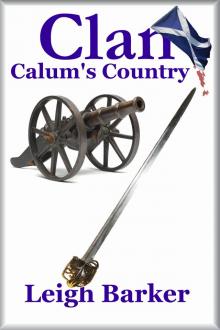 Clan: Season 3: Episode 1 - Calum's Country
Clan: Season 3: Episode 1 - Calum's Country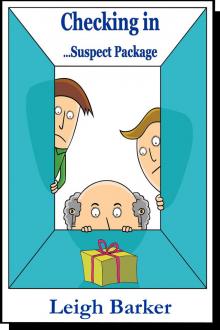 Checking In - Suspect Package
Checking In - Suspect Package Heroes
Heroes The Hellfire Legacy -The Call
The Hellfire Legacy -The Call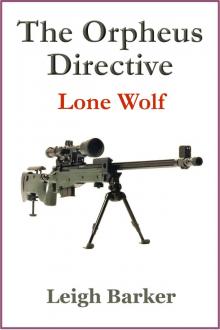 The Orpheus Directive: Lone Wolf
The Orpheus Directive: Lone Wolf Hellfire- The Series, Volumes 1-3
Hellfire- The Series, Volumes 1-3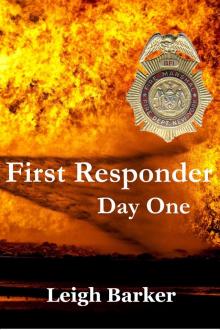 First Responder: Day One
First Responder: Day One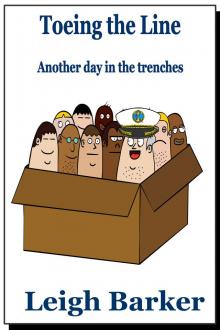 Toeing the Line
Toeing the Line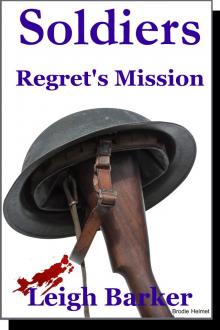 Regret's Mission - Inspired by the great Bernard Cornwell Sharpe
Regret's Mission - Inspired by the great Bernard Cornwell Sharpe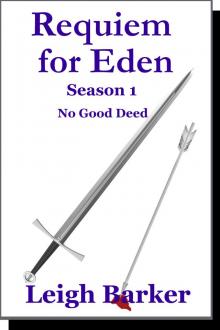 No Good Deed
No Good Deed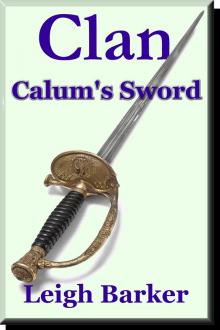 Calum's Sword
Calum's Sword